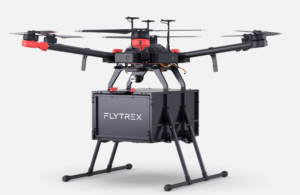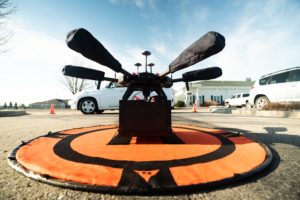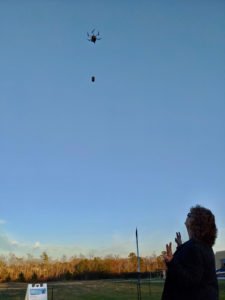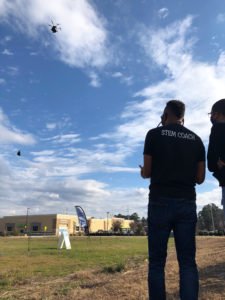 At last week’s “Let’s Talk Drones” chat room, the audience got to see an end-to-end Flytrex drone delivery: from the order, placed on a phone app, to the delivery of a hot Starbuck’s coffee drink at the Flytrex and Causey Aviation operations center in Fayetteville, NC. The whole process was so fast – and so easy – that there is no doubt at all that consumers will embrace drone delivery as soon as available. DRONELIFE goes in-depth with Flytrex co-founder and CEO, Yariv Bash, on bringing drone delivery to a backyard near you.
At last week’s “Let’s Talk Drones” chat room, the audience got to see an end-to-end Flytrex drone delivery: from the order, placed on a phone app, to the delivery of a hot Starbuck’s coffee drink at the Flytrex and Causey Aviation operations center in Fayetteville, NC. The whole process was so fast – and so easy – that there is no doubt at all that consumers will embrace drone delivery as soon as available. DRONELIFE goes in-depth with Flytrex co-founder and CEO, Yariv Bash, on bringing drone delivery to a backyard near you.
Israeli-owned company pioneers backyard drone deliveries in U.S.
By Jim Magill
While drone delivery of crucial medical equipment and supplies is becoming increasingly common in the U.S., having a drone deliver a meal from your favorite hamburger place to your backyard still seems like a vision of some far-off future.
 Hoping to change that situation is Flytrex, a Tel Aviv-based drone delivery start-up, which last fall partnered with Walmart to launch a pilot program for backyard drone deliveries in Fayetteville, North Carolina. Eventually, the company hopes to partner with other vendors, including fast-food restaurants, seeking a quick delivery service for their products.
Hoping to change that situation is Flytrex, a Tel Aviv-based drone delivery start-up, which last fall partnered with Walmart to launch a pilot program for backyard drone deliveries in Fayetteville, North Carolina. Eventually, the company hopes to partner with other vendors, including fast-food restaurants, seeking a quick delivery service for their products.
“You can’t use a truck to deliver a hamburger to someone’s house. You need something very affordable, and something that can do lots of deliveries in an hour,” Flytrex cofounder and CEO Yariv Bash said in an interview. “That’s the system we’re building.”
In its North Carolina pilot program, Flytrex’s specially designed drones can carry payloads of up to 6.6 pounds for a distance of 3.5 miles and back to home base. Customers can opt to have deliveries made in their backyard or to a public delivery point.
“All you have to do is install the Flytrex app, select the products that you like, insert your credit card number and enter your home address. If your home address is supported, you’ll be able to get that into your back yard and if not, you’ll have the option of the public location,” Bash said.
 Once the address is entered, working together with Walmart, Flytrex will pick up the selected items and launch the drone. The unmanned aerial vehicle (UAV) will autonomously fly to the drop-off point, where it will hover at an altitude of 80 feet and lower the purchased items safely to the ground with a cable. Bash said the drone delivery company has been working with the Federal Aviation Administration for four years to earn the permission to fly over houses and make drop-off deliveries in suburban areas.
Once the address is entered, working together with Walmart, Flytrex will pick up the selected items and launch the drone. The unmanned aerial vehicle (UAV) will autonomously fly to the drop-off point, where it will hover at an altitude of 80 feet and lower the purchased items safely to the ground with a cable. Bash said the drone delivery company has been working with the Federal Aviation Administration for four years to earn the permission to fly over houses and make drop-off deliveries in suburban areas.
In November the FAA published airworthiness criteria for the proposed certification of Flytrex’s system and those of nine other drone operators. “This is a crucial step to enabling more complex drone operations beyond what is allowed under the small unmanned aircraft rule (Part 107), including package delivery,” the agency said in a statement.
Cloud-based operating system
Bash said the company can afford to operate economically in part because its drones are very simple, lightweight and easy to operate. They don’t carry cameras but instead are controlled by a sophisticated cloud-based system, which controls the flights in real time.
“There’s no joystick. There’s no vertical cockpit, no remote backup,” he said. “When you input your home address the system knows if that address is supported and if so, where is the exact spot in your backyard where we’ll be delivering your package.
 Of course, a human operator retains the ability to assume full control of the drone should any problem arise. “He can instruct the drone to return home or to land in a designated safe area if needed, but besides that the system is pretty much autonomous,” Bash said.
Of course, a human operator retains the ability to assume full control of the drone should any problem arise. “He can instruct the drone to return home or to land in a designated safe area if needed, but besides that the system is pretty much autonomous,” Bash said.
The UAV system has multiple, built-in redundant features designed for safe operations in a moderately populated suburban environment. “We can sustain a motor loss, a battery loss, a GPS loss,” he said. “If everything fails and if the drone flies out of the suggested flight path or falls down or flips, we have an independent system that can identify that. It sounds a siren, shuts down the motors and ejects a parachute.
To ensure its safe operation, the parachute system alone was tested in 45 different scenarios with third-party monitors watching. “We’re happy to help the FAA make sure the skies stay safe,” Bash said.
Moonshots and drone deliveries
 Even before taking on the challenge of becoming a pioneer in the field of backyard drone deliveries, Bash has had a long history of taking on seemingly impossible challenges. An electronics engineer by training, he worked for roughly a decade with the Israeli Ministry of Defense, helping develop “a lot of cool technologies,” such as signal possessing and reverse engineering.
Even before taking on the challenge of becoming a pioneer in the field of backyard drone deliveries, Bash has had a long history of taking on seemingly impossible challenges. An electronics engineer by training, he worked for roughly a decade with the Israeli Ministry of Defense, helping develop “a lot of cool technologies,” such as signal possessing and reverse engineering.
“In 2010, I had a crazy idea of sending an Israeli spacecraft to the moon,” he said. Together with co-founders Kfir Damari and Yonatan Weintraub, Bash formed SpaceIL, a private, non-profit corporation, which raised about $100 million. “From there, we built the first private moon-bound mission.”
It took the scrappy start-up space company almost a decade to build the spacecraft, which crash-landed on the moon in 2019. Although the spaceship crashed, Bash considers the mission a success. For one thing, it made Israel the seventh nation to reach to the lunar surface. It also marked the first time any nation or private company had tried to reach the moon in its first attempted launch, rather than going through a succeeding series of near-lunar missions.
 While still working with the SpaceIL project, in 2016 Bash and a partner started Flytrex, to focus on his dream of making backyard drone delivery safe and affordable. In the first two years, the company focused on developing GPS tracking systems for drones.
While still working with the SpaceIL project, in 2016 Bash and a partner started Flytrex, to focus on his dream of making backyard drone delivery safe and affordable. In the first two years, the company focused on developing GPS tracking systems for drones.
Then, in August 2018, operating in the city of Reykjavik, Iceland, Flytrex became the first company in the world to make a delivery by drone directly to a customer’s backyard. Bash said Flytrex chose Iceland as its testing ground, because of that nation’s less stringent regulations for drone operations.
“Over there, we’re flying beyond visual line of site, above a city, above highways, things that are still groundbreaking in a lot of other parts of the world,” Bash said.
Currently, because the company is still in the R&D phase of its U.S operations it still is manufacturing its drones and related systems in Tel Aviv. However, Flytrex is building a production line in Liberty, North Carolina, near Raleigh, where it hopes to begin manufacturing FAA-certified drones later this year.
Bash said that once Flytrex receives its drone type certification from the FAA, the company plans to expand to states outside of North Carolina. “We’ll be looking out for local operators to operate the fleet in each state. Hopefully, during the next year, we’ll start seeing very large deployment of drone deliveries.”







[…] more about Flytrex’s drone delivery program, FAA approvals, and company […]